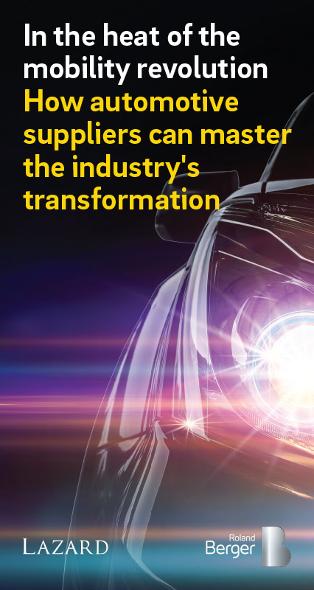Overcapacities and declining profitability put automotive suppliers in a difficult position
![{[downloads[language].preview]}](https://www.rolandberger.com/publications/publication_image/report_global_automotive_supplier_study_2019_en_1_download_preview.jpg)
Automotive suppliers are under massive pressure. We show different options for action.


"The main reasons for this development are trade conflicts and new trends such as electric mobility."
The automotive industry is a key industry, which provides around 1.8 million jobs in Germany. As the sector is facing tremendous upheaval in the wake of the mobility transition, manufacturers are increasing financial pressure on suppliers, who should be investing themselves. In cooperation with investment bank Lazard, Roland Berger has analyzed the current situation in the industry and developed recommendations for companies to act on.

The seriousness of the situation is illustrated in particular by one indicator: profitability. The industry expects an EBIT margin of only six percent for the current year, the lowest figure since 2012. Suppliers should in fact secure sufficient financial leeway for investments that will bear fruit in the long term.
At the same time, when it comes to investments, suppliers have to place bets on an uncertain future: Which technologies should they rely on? Pure electromobility? Hybrids? Or will another propulsion technology, such as hydrogen vehicles, become the model of the future? The outcome is currently more uncertain than ever and it is difficult to predict when – if ever – investments will yield a profit.
The so-called MADE factors ( new mobility trends , autonomous driving, digitalization and electrification) put established manufacturers and the supply industry alike under great investment pressure. Against this backdrop, car manufacturers are trying to reduce their costs, among other measures by reducing overheads in purchasing, which in turn is affecting suppliers.
The situation is additionally exacerbated by global tensions such as the trade conflict between the United States and China, as well as the fact that the market is stagnating in North America and slightly declining in Europe. For example, 60 to 70 percent of the capacities of individual suppliers in Chinese plants remain unused. The negative market trend is reflected in sales figures: In the first half of 2019, the number of units produced was 46 million, five percent lower than during the same period in 2018. Market observers do not expect a turnaround for the rest of the year.
In the "Global Automotive Supplier Study 2019", Roland Berger and Lazard evaluated key figures from 600 suppliers worldwide, put together an analysis of the current situation, identified the causes and developed recommendations for the industry. The first step is for suppliers to assess their own situation correctly. To this end, Roland Berger has developed a system from which different instructions for action can be derived.
There is no such thing as a universal strategy that will suit all companies. Rather, there is an individualized program in which processes, methods and the organization are optimized in such a way that supplier companies can withstand the pressure to change and operate profitably and successfully in the long term. One generalized statement, however, applies to all affected: "Take change in the industry seriously. You should act now."
To get the in-depth version of the study register for the automotive insider updates newsletter below.

![{[downloads[language].preview]}](https://www.rolandberger.com/publications/publication_image/report_global_automotive_supplier_study_2019_en_1_download_preview.jpg)
Automotive suppliers are under massive pressure. We show different options for action.